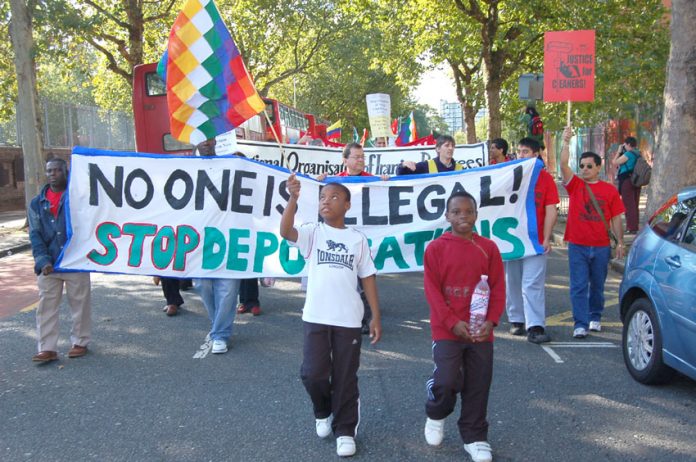By Simon Parker, End Child Detention Now Co-ordinator
End Child Detention Now campaigners have welcomed the launch of the International Detention Coalition’s Global report and campaign to end immigration detention of children.
The report and campaign were launched at the UN Human Rights Council on Wednesday at the 19th Session of the United Nations Human Rights Council in Geneva, Switzerland.
The International Detention Coalition (IDC) and NGOs from around the world have announced the launch of a global campaign to stop the growing practice of child immigration detention by governments.
Every day, around the world, thousands of children are locked up simply because they do not hold the right documentation.
Many of these children are unaccompanied minors. Immigration detention has a devastating effect on children’s physical, emotional and psychological development and must be stopped.
These are some of the key findings released in IDC’s report ‘Captured Childhood’ at the start of a global campaign to stop the growing practice of child immigration detention by governments.
The report and campaign were launched on Wednesday at the 19th Session of the United Nations Human Rights Council in Geneva.
This follows strong comments on this issue from the High Commissioner for Human Rights, most recently in her opening statement to the Council on the second of March.
The report includes interviews with 70 children who had been detained in 11 countries.
Among them, Yusuf, who fled his village in Sudan when it was attacked and many people were killed.
He escaped with a couple of other boys, paid traffickers in Libya and was lost at sea for six days before being detained in Malta as a 16 year old.
He told the report researchers: ‘All of us left. Nobody of the village who was still alive stayed in that place anymore…
‘We were lost, six days at sea. We just prayed…They put us in detention…I was so frightened.
‘For me it was like prison. Depriving me of my freedom of movement. You want to be just walking outside.’
Immigration detention of children occurs globally.
It is estimated that there are thousands of children in detention every day and hundreds of thousands every year, including in Australia, Greece, Israel, Malaysia, Mexico, South Africa and the United States.
For example, Australia currently holds 528 children in secure and remote facilities and there are approximately 100 unaccompanied minors currently detained in Greece.
These numbers fluctuate daily and most governments do not keep or release data about child detention.
The campaign asks governments to collect and publish disaggregated data on children and families subject to immigration detention.
In Britain, despite the coalition government’s promise to end the practice of detaining children, children continue to be arrested in dawn raids and detained in ‘pre-departure accommodation’ for up to a week.
Meanwhile, Tinsley House – a high security immigration removal centre near Gatwick Airport, which was intended for use only under exceptional circumstances – continues to hold more than a third of all detained children.
Detention, even for a very short period of time, can cause long-lasting damage and is unnecessary in the case of children and families.
‘Substantial evidence shows that detention, even for short periods, can seriously damage the mental health and development of children – from infancy through teenage years’, said Dr Madelyn Hicks, psychiatrist at the launch.
‘Children also suffer because their parents lose authority over what they eat and how they sleep, and because their parents often also suffer from the mental affects of detention.’
The ‘Captured Childhood’ report describes models to prevent the immigration detention of children already in practice in countries such as Belgium, Philippines, Argentina, Sweden and Japan.
‘It is possible for governments to end child immigration detention and set up humane alternatives’, said Jeroen Van Hove, Campaign Coordinator.
He added: ‘Governments should not detain children just because they are fleeing abuse, war and poverty or don’t have any papers.
‘Many of these children are unaccompanied, have lost their parents, are already traumatised and just want safety.
‘Children should not be locked up. They pose no threat to the community.’
Dr David Corlett, researcher for the International Detention Coalition, said: ‘This is about the basic human rights of children and about obliging governments to respect, care for, and protect their rights as required under international law.
‘It is never in the best interests of a child to be detained for immigration purposes.
‘States should ensure that a minimum level of protection and support for children is in place in the community.’
Dr Simon Parker, campaign coordinator for End Child Detention Now, added: ‘The detention of children for immigration purposes is a global scandal that needs to be confronted through worldwide action to hold to account all governments that violate the rights of the child.
‘The United Kingdom should not be continuing the detention of children – it should be setting a standard of “no detention, no exceptions” for other countries to follow.
‘We fully support the International Detention Coalition in this important campaign.’
The global campaign to end the immigration detention of children was launched in 20 countries on Wednesday and initially focused on: Australia, Greece, Mexico, Israel, Malaysia, South Africa and the United States.
Children around the world will also record messages of support for those children in detention who are unable to speak up for themselves.
